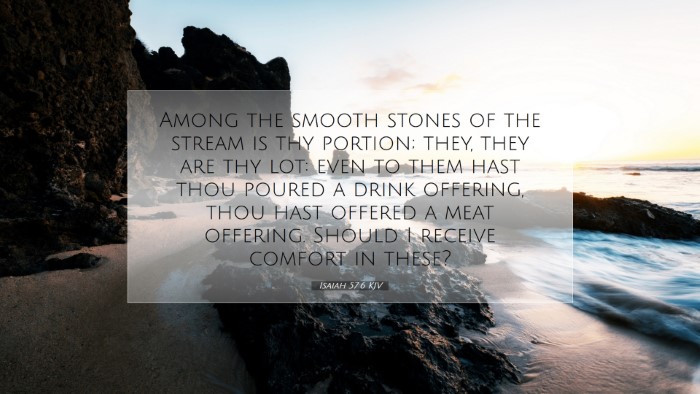Isaiah 57:6 - Commentary Summary
Text of Isaiah 57:6 (NASB): "Among the smooth stones of the stream is your portion; they, they are your lot. Even to them you have poured out a drink offering, you have made a grain offering. Shall I relent concerning these things?"
Introduction
The verse under consideration, Isaiah 57:6, serves as a poignant commentary on idolatry and its consequences. Within the context of Isaiah, this aspect highlights the futility and emptiness of idol worship as contrasted with the worship of the true God. Utilizing insights from classic public domain commentaries, we can explore its implications for spiritual fidelity and judgment.
Exposition of the Verse
Understanding the 'Smooth Stones'
Matthew Henry notes that the "smooth stones of the stream" represent the idols to which the people of Israel have turned their hearts and offerings. The smoothness signifies deception; they appear inviting and harmless but ultimately lead to spiritual dryness and barrenness.
The 'Portion' and 'Lot'
Albert Barnes comments that the "portion" and "lot" indicate the inheritance that those who indulge in idolatry seek. However, this is hollow, as they are pursuing a legacy of destruction rather than divine favor. The reference to the stream can also symbolize a superficial flow of worship that is not rooted in the deep truths of God.
Drink and Grain Offerings
As Adam Clarke elaborates, the drink offerings and grain offerings were intended for God, but in this context, they are misapplied. The people of Israel offer sacrifices to idols, demonstrating their misplaced devotion. This leads to a critical assessment of the true nature of worship and the heart's intent behind it.
Divine Judgment
The concluding question, "Shall I relent concerning these things?" serves as a challenge. Henry emphasizes that it reflects God's indignant response to their idolatry. The rhetorical nature of the query implies that God will not overlook the sins of His people, drawing attention to His justice.
Theological Insights
Idolatry Defined
Idolatry goes beyond the mere worship of physical idols; it encompasses anything that takes the place of God in one’s life. Modern-day applications could include materialism, relationships, or even self-worship. Clarke emphasizes that it is the heart's inclination away from God that constitutes idolatry, resonating through the ages.
God's Response to Idolatry
Barnes points out that God's wrath is provoked by unfaithfulness. This serves as a warning for contemporary believers. Turning to idols distracts from the commitment that God desires. As such, the phrase "Shall I relent" signifies God’s unwavering standards and His demand for repentance.
Practical Applications
- Self-examination: Believers are called to assess their own lives for areas of idolatry that may have taken root.
- Understanding True Worship: Engage in sincere worship that aligns with the principles set forth in Scripture.
- Consequences of Choices: Recognize that every idol pursued leads away from true solace and fulfillment found in God.
Conclusion
Isaiah 57:6 eloquently encapsulates the dangers of idolatry and the necessity of fervent loyalty to God. This verse serves as both a warning and a clarion call to worship in spirit and truth. For pastors, students, and theologians, it stresses the weight of choice and the need to direct one's heart and offerings towards the Almighty, ensuring that God alone remains the center of true worship.
Further Reflection
As we meditate on this verse, let us seek God's guidance in recognizing our own 'smooth stones' which may be leading us away from His grace and blessings. Let this knowledge inspire us to pursue a deeper relationship with God, rooted in authentic worship and reverent offerings."


